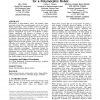429 search results - page 45 / 86 » Polymorphic typed defunctionalization |
LISP
2008
13 years 7 months ago
2008
Trace effects are statically generated program abstractions, that can be model checked for verification of assertions in a temporal program logic. In this paper we develop a type a...
HRI
2006
ACM
14 years 1 months ago
2006
ACM
Polymorphic, or shape-shifting, robots can normally tackle more types of tasks than non-polymorphic robots due to their flexible morphology. Their versatility adds to the challeng...
OOPSLA
2005
Springer
14 years 1 months ago
2005
Springer
Parametric polymorphism has become a common feature of mainstream programming languages, but software component architectures have lagged behind and do not support it. We examine ...
ECOOP
2000
Springer
14 years 4 hour ago
2000
Springer
This paper studies specific language level abstractions for component-based programming. We propose a simple model which captures some basic ingredients — like explicit context ...
RAID
2005
Springer
14 years 1 months ago
2005
Springer
Abstract. Network worms are malicious programs that spread automatically across networks by exploiting vulnerabilities that affect a large number of hosts. Because of the speed at...

